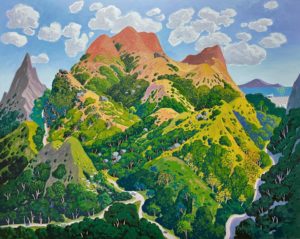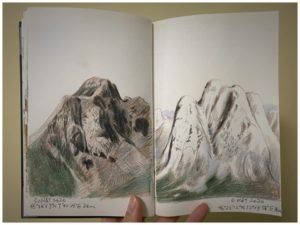 ASLE’s Scholar of the Month for August 2020 is Kiu-wai Chu.
ASLE’s Scholar of the Month for August 2020 is Kiu-wai Chu.
Kiu-wai Chu is an Assistant Professor in Environmental Humanities and Chinese Studies at Nanyang Technological University, Singapore. His research focuses on ecocriticism and eco-aesthetics, animal studies, and contemporary cinema and visual art, specifically in Chinese and Southeast Asian contexts. His work has appeared in Transnational Ecocinema; Ecomedia: Key Issues; Cli-fi: A Companion; Chinese Environmental Humanities; Asian Cinema (journal) and elsewhere.
How did you become interested in studying ecocriticism and/or the environmental humanities?
I believe I am naturally drawn to ecocriticism and environmental humanities by two experiences in life: the daily encounters in my excessively urbanized hometown Hong Kong and the countless movies I saw as a film studies student. Seeing independent films produced by the Sixth Generation Chinese filmmakers on the country’s drastic changes and development in the past two decades and witnessing ubiquitous urban ruins, abandoned demolition and construction sites in my journeys through various parts of China triggered me to conduct research in the eco-politics and aesthetics of natural and urban environments in contemporary world.
In the past decade or so, my PhD and postdoctoral research endeavors has given me the opportunity to live and experience the diverse cultures and environments in parts of Asia, the US, Europe and Australia. In hindsight, that process has helped connect me with the very supportive global ecocriticism community. I’ve met many wonderful academics and students, particularly at the ASLE conferences I attended since 2013.
Who is your favorite environmental artist, writer, or filmmaker? Or what is your favorite environmental text? Why?
I am always fascinated by films that explore the relationships between humans and the environment in artistic ways, such as the works of Andrei Tarkovsky, Abbas Kiarostami, Terrence Malick, Tsai Mingliang, Jia Zhangke, Naomi Kawase, and Apichapong Weerasethakul. I also research Chinese artists whose artworks are influenced by classical shanshui (Chinese landscape) aesthetics, such as Xu Bing and Yang Yongliang’s art and photographic installations.
My recent favourite is a young Hong Kong artist Stephen Wong Chun Hei, a landscape painter strongly influenced by the work of John Constable. He is dedicated to painting Hong Kong’s mountains through outdoor sketching. In the precarious time of the COVID-19 pandemic, he substitutes his physical hikes with virtual journeys on Google Earth and continues to be productive in sketching and painting mountains of the world!

Stephen Wong Chun Hei, The Red Top Tai Tung Shan, 2020 (Photo courtesy of the artist)

Stephen Wong Chun Hei, Sketches of Swiss mountains observed on Google Earth, 2020 (Photo courtesy of the artist)
What are you currently working on?
I have been working from home on multiple tasks over the pandemic.
That includes a research paper on Gabrielle Brady’s Island of the Hungry Ghosts, a poetic and beautifully shot Australian documentary on Christmas Island’s various inhabitants. The film juxtaposes the asylum seekers in the island’s refugee detention center, the several generations of migrants of Chinese heritage, and the 50 million migratory red crabs to explore the coexistence of human and nonhuman beings on an island with a long and little known history of social and environmental injustices over the past century.
Research aside, I have been quite excited about developing an undergraduate minor programme in Environmental Humanities in my university, being one of a few in Asia. I am also preparing two new courses for the coming semester: Introduction in Environmental Humanities and Chinese Ecological Thoughts and Philosophy.
Beyond academia, I am curating a public film screening series for Asia Film Archive in Singapore. The programme is scheduled for October and will showcase a series of films that address environmental issues in Asian contexts. To name a few, I plan to include classics like Ernest Schoedsack and Merian C Cooper’s Chang: A Drama of the Wilderness (1927); Akira Kurosawa’s Dreams (1990); a Hong Kong film from the 1970s about epidemic outbreak, Yesterday Today Tomorrow (1970); and newer titles like Island of the Hungry Ghosts (2018) and Mekong 2030 (2020).
What is something you are reading right now (environmental humanities-related or otherwise) that inspires you, either personally or professionally? Comment briefly on why or how it inspires you.
I am reading social anthropologist Frédéric Keck’s Avian Reservoirs: Virus Hunters & Birdwatchers in Chinese Sentinel Posts (Duke University Press 2020), a timely book that offers a multispecies ethnographic study in how humans, birds and viruses enter into relations in the contexts of influenza pandemics since early 2000s. Keck sees Hong Kong, Taiwan and Singapore as three Chinese diaspora hubs that, since the SARS crisis in 2003, have found in avian influenza a language to communicate about the geopolitical tensions they have with Mainland China. More importantly, his multispecies study decenters humans’ role in the ecology of infectious diseases and reveals the complex and intertwining human-animal-virus relations that shape the global imaginary of zoonotic pandemics in recent years. It is fascinating to see how Keck weaves together multispecies ethnography with transnational public health issues and urges us to re-evaluate our relations with animals and viruses, in order to better prepare ourselves for more zoonotic diseases to come.
I am also reading Eating Chilli Crab in the Anthropocene (Ethos Books, 2020), edited by Matthew Schneider-Mayerson. The lovely collection of essays examines contemporary Singaporean life and culture through an ecocritical lens and offers fresh insights on various aspects of life in this small island city-state in Southeast Asia. It is great to learn what classic Malay horror films, concerning an “oily monster” Orang Minyak, have to say about Singapore’s petroculture and also how we can eat chilli crabs with more compassion. What is most precious is that all authors of the book were born between 1993 and 1998. It offers the ecocritical voices of the younger generation a chance to be heard.
Is there a scholar in the field who inspires you? Why?
I came to know Scott Slovic in 2012 during my Fulbright year as a doctoral student in Moscow, Idaho. He has been (and continues to be) the most supportive and encouraging mentor and friend one could ever find!
In addition to his irreplaceable roles in establishing ASLE and editing ISLE for over two and a half decades, Scott has been reaching out far in supporting the global ecocritical communities. In this aspect, I am particularly inspired and will also see it as my professional goal to contribute in connecting like-minded people internationally. While things are looking pretty gloomy with the pandemic and the increasingly fractious international relations, I am hopeful we could still work together to find new solutions to the environmental problems in the world.
On a lighter note, Scott’s instant replies to my e-mails are always effective reminders that I should reply to others more promptly, and always show my care and concern for others!
